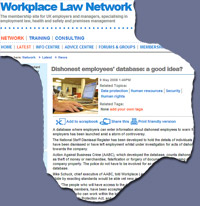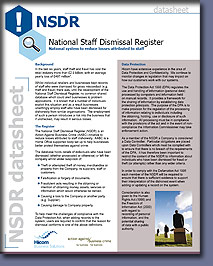 |
||
 |
||
|
|
||
|
Controversy Over Sacked Workers Database Unionsafety has this week been amongst the first to report on the latest threat to health & safety, workers rights, and civil liberties. As the reality over the new database detailing those who have been dismissed by their employers for theft, dishonesty, or in any way costing the business money, starts to sink in, the principles involved and necessity for the National Dismissal Register are being examined.
The system holds details of individuals who have been dismissed (whether prosecuted or otherwise) or left the company whilst under suspicion of:
Of course this is just the current data held, and the possibility/probability of it being extended to add other criteria is extremely high. There is a wide 'catch all' approach being adopted in order to add people to the register. The Government via the Home Office have been involved in this project with over £1 million over a 3 year period being put into the project. Many will be asking themselves why is the Labour government spending money on a database that potentially compromises the intent behind its 'whistle blower' and health & safety legislation, and support for employees who take action in the face of illegal or dangerous activities of their employers?
Sharp says that if there was also a database a company’s employment disputes for potential employees to peruse then the idea would be more acceptable, but disagreed with the ‘naming and shaming’ idea on the whole because of its subjectivity. Employers can currently carry out criminal records checks on a prospective or current employees in limited circumstances. Earlier this week, as reported here, the TUC also condemned the developement of the register. In the meantime further justification for the database is being pronounced by Mike Schuck, chief executive of Action Against Business Crime (AABC), which developed the database. He points to Workplace Law Network that the police do not have to be involved for an employee to be put on the database. He told Workplace Law Network that only employers who abide by exacting standards would be able vet new recruits through the database: "The people who will have access to the database are companies that have agreed to become members, have been accepted as people who have responsible employment policies, who can work within the Information Commissioners’ employment policy guidelines and the Data Protection Act, and who can be trusted to manage the system in full compliance with the law."
"At the end of the day [an employer] has to go through a disciplinary process where they have confronted this person with their misconducts; have presented evidence to this person of that misconduct; and if necessary that person has appealed internally. If that person feels they have been unlawfully dismissed, then there is redress through Employment Tribunal. Obviously, under the Data Protection Act, there are rights to make sure that any data held about the employee is correct and accurate, so they can ask us or their employer for a record, and if they dispute the data then they need to take that up with their employer. If their employer says that the data is correct and it is staying on the database then the employee can then apply to the Information Commissioner.” Commentators point out that the problems people have already in getting database records used by credit reference agencies amended where incorrect information is held on individuals and often it results in severe financial problems for the individuals concerned. Furthermore, they point to the recent lapses in data protection by the HMRC, DWP and banks - all of which have not resulted in one single prosecution by the Data Protection Registrar. The Information commissioner has apparently approved the database and it is claimed that access to it will be minimal, which of course begs the question as to it's necessity in the first place. Some large companies have already signed up to use the database, including retailers Harrods, HMV, Mothercare, Selfridges, and outsourcing agency Reed Managed Services. No one is blind to the fact that despite this being aimed at the Retail industry, it does not preclude organisations from any business sector, including telecomms, postal and of course financial services industries from becoming involved. Indeed, the fear is that peer pressure and competition will ensure that eventually access to the database will become the norm for all businesses in their recruitment and disciplinary procedures. Related news item: Sacked Workers To Be 'Blacklisted' And Named On National Register Source: Workplace Law Network / BBC News / Personnel Today / Hicom |
||
 For the H&S community serious concerns are being raised. Not only does it threaten the work of USRs and employees with concern for H&S, it creates an atmosphere of fear amongst employees. It will also encourage employers to dismiss and 'blacklist' as a vindictive response to an employee who has transgressed, whilst at the same time remaining outside of the law due to the adverse publicity reporting theft or dishonesty may bring to the company concerned.
For the H&S community serious concerns are being raised. Not only does it threaten the work of USRs and employees with concern for H&S, it creates an atmosphere of fear amongst employees. It will also encourage employers to dismiss and 'blacklist' as a vindictive response to an employee who has transgressed, whilst at the same time remaining outside of the law due to the adverse publicity reporting theft or dishonesty may bring to the company concerned. Concerns have this week been expressed by Workplace Law Network's Managing Director David Sharp, who says that whilst he can understand why some employers would want to sign up to the database, he does not see the point of it:
Concerns have this week been expressed by Workplace Law Network's Managing Director David Sharp, who says that whilst he can understand why some employers would want to sign up to the database, he does not see the point of it: 